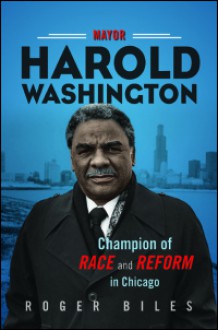
My latest podcast is up on the New Books Network website! In it, I interview Roger Biles about his biography of the 1980s Chicago mayor Harold Washington (which I reviewed here). Enjoy!

My latest podcast is up on the New Books Network website! In it, I interview Roger Biles about his biography of the 1980s Chicago mayor Harold Washington (which I reviewed here). Enjoy!

I was intrigued by the premise and it was a pleasant story but I expected something a little more.
It wasn't really all that gripping. It was a little too convenient too. Everything worked together more like a modern fairy tale, a happy dream that these things could even begin to happen, even the end of the main situation isn't exactly happy. It's more strange and beautiful than believable.
For someone who loves a fairy tale, which is inherently not believable, it was a nice little book for a day when you want to read something a little light and not so serious. I did have some issues with certain lines that were a little off for our female protagonist, they were a little sexist, like an annoying bit about being accustomed to lying by virtue of being a sixteen year old girl and some assumptions about tears. Do girls do these things? Yeah, some do, and so do boys (more the lying because it's socially unacceptable for them to cry but they have manipulative equivalents), but part of it is the way that piece was written. Like all girls are like that and it's a girl thing. Like it's natural and obvious. It annoyed me but it wasn't a common theme throughout the story, so I chose to forgive it, but it was the kind of moment that made my skin crawl at the idea that any man actually thinks we all think like that. I hate it when that happens and it was this sort of thing that drove me nuts in some of the Dangerous Women stories.
The book begins with the contents of the diary, which has some holes in the story of it all. It had made me not quite want to finish, but there was enough left to the story that I decided to carry on. They do get mostly resolved and the holes in the story of the diary are put there on purpose, and spur on the third part of the story. Still, it was all convenient, even when it was tragic. None of this stopped it from being a nice story to read but it all kept it from being something as gripping as All the Light We Cannot See by Anthony Doerr, which was the level of work that I had been hoping for.
Still, it was nice to read something a bit more hopeful and something short and easy on a weekend like this past one. I had done a lot more reading than I thought I would because I hadn't anticipated choosing such short books.
My second podcast for the New Books Network is up! It's an interview with the longtime historian Roger Daniels about his new two volume biography of Franklin Delano Roosevelt, Road to the New Deal, 1882-1939 (which I reviewed here) and The War Years, 1939-1945 (reviewed here). It was a challenging interview in some respects, though I have to say that I hope I'm doing as well when I'm approaching my tenth decade on the planet!

James Santel rereads John Updike's Collected Stories:
While not willing to go as far as Franzen, who argues that Updike was “wasting” his “tremendous, Nabokov-level talent,” I was surprised by how many of Updike’s stories impressed me while I read them, and how few left an impression. One can open the Collected Stories to almost any page and find a surprising metaphor, a lovely description, or a wry morsel of irony without remembering much of anything about story that contains it....
The curious paradox of Updike is that he made art into a craft, but only rarely did he transcend craft to achieve art. In a sense, then, the answer to Wood’s question is that beauty is not enough, at least not the beauty of finely tuned prose and vivid images that was Updike’s specialty. Art requires the wedding of aesthetics and morals, and the case might be made that the morals are more important; few people would call Dostoyevsky a beautiful writer, but even fewer would contest that he was a great artist.
I have long been a fan of Updike, if only because he was one of the first really serious writers I read as a teenager. (This is the same reason why I will always have a soft spot for Joyce Carol Oates.) But he writes beautifully and has more to say than he is sometimes given credit for. I prefer his novels to his short stories, which I think are more successful in avoiding the beautiful-nothing problem. One of the projects I have in mind for "someday"--most probably when the kids are out of the house--is to reread his Scarlet Letter trilogy as well as my favorite of his novels, In the Beauty of the Lilies.